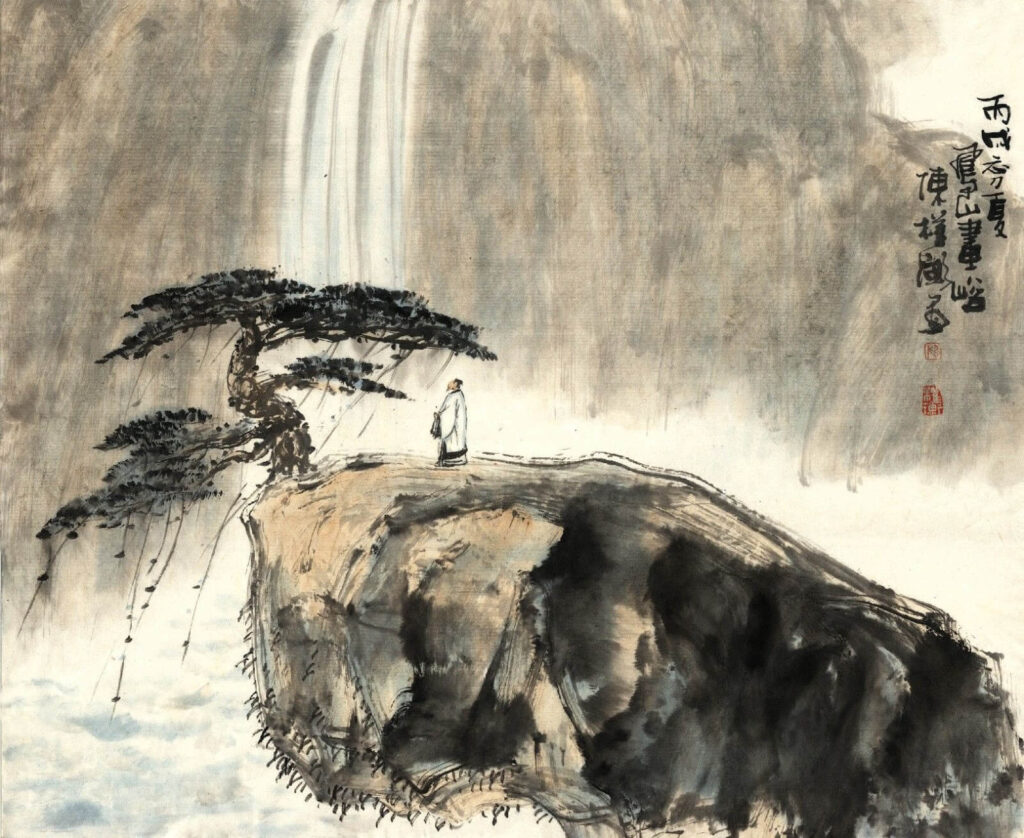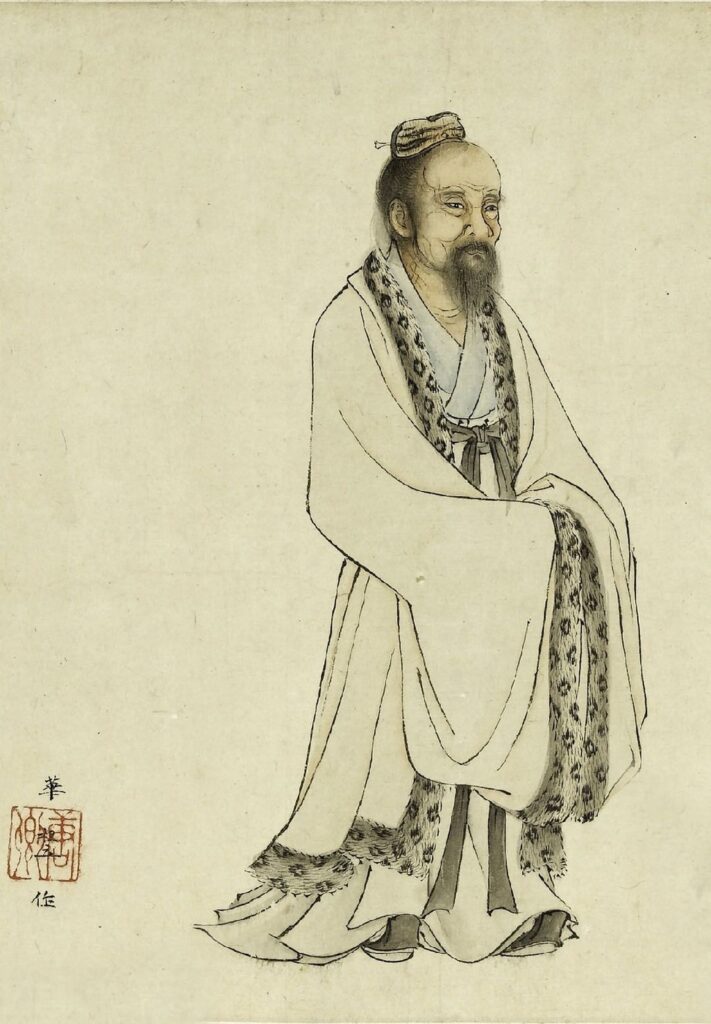
Taoism as a reaction against Confucianism
Many of us see Taoism as having directly arisen from the pre-literate spirituality of China, along with yinyang’s “one as two” approach to one’s dealing with the world and its dynamic apprehension of the real as a Way rather than an ontological entity. This view is not incorrect but it may lead us to forget that both yinyang and Tao go much further back in history than the 4th century BCE when the two foundational texts of the Tao Te Ching and the Chuang-tzu were written. A rather sophisticated development of the Yinyang system had already been taken place in the Yijing dating to Western Chou period (1000–750 BCE) and Confucius already knew of the Tao. So what the sages who contributed to the Laozi and the many “stories” found in the Chuang-tzu had to do is articulate their ideas in reaction to, often in opposition to, what had already been said about concepts such as tao, ch’i, yin and yang, often having to use Confucian concepts such as the decree of Heaven.
A C Graham writes: “In Confucianism Heaven is the supreme power responsible for everything which is independent of man’s will, including his destiny and the moral principles by which he should live (Destiny is the ‘decree of Heaven’). In human affairs it is one’s responsibility as a man to act rightly, but whether the result is success or failure, wealth or poverty, long life or early death, is decreed by Heaven and should be accepted with contentment as one’s destiny.”
Even though, late in the 5th century, Mo-tzu (c. 470 BC–c. 391 BC), the founder of Mohism, had been the first to contest the authority of Confucius, Graham says that he had, originally at least “grounded its morality in the ‘will of Heaven’,” without, however, accepting the notion of destiny, insisting instead “that good and ill fortune are Heaven’s rewards and punishments for our actions.” To a point, it is the endless disputations between Confucians and Mohists, each arguing from a different standpoint and getting nowhere, that “encouraged him in his uncompromising moral relativism.”
Then, Graham writes, “around 350 BC it began to be noticed that the dichotomy of Heaven and man presents a fundamental difficulty if one recognises that there is such a thing as human nature. Given that it derives from one or the other, man’s nature, being independent of his will, must be ordained for him by Heaven. Should it not follow that man obeys Heaven by following his own nature, which seems to conflict with morality? … This is the start of the first profound metaphysical doubt in Chinese thought, and stimulated the great advances of the late 4th century BC. Among the Confucians, Mencius tried to close the gap between Heaven and man by the doctrine that human nature is morally good. The later Mohist school ceased to appeal to the authority of Heaven and sought new foundations for morality by developing a highly rationalised utilitarian ethic based on the actual desires and aversions of men.”
To a point, it appears that Chuang-tzu’s position is close to that of Mencius, as for him, the sage “constantly goes by the spontaneous and does not add anything to the process of life.” So, Chuang-tzu would not say that the sage “obeys” Heaven, he simply follows his natural inclinations and spontaneously abides by what Heaven prompts him to do. Note, however, that Chuang-tzu is talking about the “sage,” not the ordinary man and woman. What he refers to as spontaneity is not inherited at birth for humans. It is a talent or an art that needs to be developed through self-cultivation.
Spontaneity is not a given, but a skill that must be cultivated
For Chuang-tzu, spontaneity must be attained through the cultivation of a “clear mirroring” that, in Graham’s words, rejects “the passions which blur awareness, exalting the impulses which stir in an impersonal calm which mirrors the situation with utmost clarity.” In fact, though the word “nature” is often used in the Outer Chapters, it does not appear in the Inner Chapters. So, it is not so much that Chuang-tzu believes, as Mencius does, that the nature of humans is naturally good. As Graham explains, “Chuang-tzu is interested not in the nature which a man inherits at birth but in the Power which he develops by intensive training. We do not possess from birth that selfless mirror-like objectivity which ensures that every prompting is the “impulse from Heaven.” To quote a writer of the Outer Chapters who does speak of nature, “By the training of the nature we recover the Power.”
Graham continues: “When thinking and putting our thoughts into words we are behaving as men; when attending and responding, in ways which we can never fully express in language or justify by reasons, our behaviour belongs with the birth, growth, decay and death of the body among the spontaneous processes generated by Heaven. We are then doing, without knowing how we do it, what Heaven destines for us. Paradoxically, to enact the destined is, since our egoism is always tempting us to think out a better way, “the most difficult thing of all” … In another dialogue [chapter 4 which I explore under the title “The Fasting of the Heart], Yen Hui, disciple of Confucius, discovers that he has never yet begun to be a Hui.”
Isn’t this very close to Buddhism’s exhorting its followers to shed their ego-centred urges and attachments so that the dynamic formlessness of emptiness can freely expressed itself through our conciousness as the forms of the phenomena we see in the world? In common with Buddhism, “he does not in practice expect to live in a permanent ecstasy moving like a sleepwalker guided by Heaven; he recognises that one must be sometimes “of Heaven’s party,” sometimes “of man’s party,” and declares that “someone in whom neither Heaven nor man is victor over the other, that is what is meant by the True Man.” In Chapter 6, “The teacher who is the ultimate ancestor,” Chuang-tzu writes: “Whoever knows what is Heaven’s doing, lives the life generated by Heaven. Whoever knows what is man’s doing, uses what his wits know about to nurture what his wits do not know about.”
But, Graham notes, “immediately after this formulation Chuang-tzu recognises that he cannot afford a dichotomy of ‘Heaven’ and ‘man’. It is his deepest certainty that all alternatives are false alternatives. He proceeds to ask ‘How do I know that the doer I call “Heaven’ is not the man? How do I know that the doer I call the ‘man’ is not Heaven? As usual he throws off his profound question without developing it, but we may perhaps risk developing it for him. Granted that there are surrenders to spontaneity in which one seems to be driven by forces from beyond, is not the carpenter or swimmer in full command of his unreasoning skill? Whether the agent is Heaven or the man himself seems to be a matter of degree. The same applies to the specifically human activities, analysing alternatives and conforming to rules. Is it not in some sense natural for man to exercise the gift of reason, an ingratitude to Heaven to refuse it? The dichotomy is elsewhere explicitly rejected: ‘For the sage there has never begun to be Heaven, never begun to be man’. But it is never quite resolved, and there are some surprising twists in the discussion. One fragment actually declares that Heaven is agent only in the animal and that the perfect man ‘hates Heaven’.”
Well, for one, it is not easy for self-conscious humans to take on board the inevitability of their physical death. We can accept that all of our cells die regularly and are replaced by new cells, so that our own life as humans can continue, but it is not as easy for us to accept that we, along with all species, must die in order for life itself to continue. Graham says, “It seems that Heaven has a kind of justice different from man’s, and requires not what we deliberately do but what we are. ‘The maker of things, when he recompenses a man, recompenses not the man but what is from Heaven in the man’.”
Chuang-tzu disagrees with Confucius’ moral ideas but he agrees with his ideas regarding Heaven.
This has led to a common misunderstanding about Chuang-tzu’s attitude towards Confucius. Graham points out that “the bitter mockery of Confucius in the Yangist chapters ‘Robber Chih’ and ‘The Old Fisherman’,’ and the elaborate condescension with which Old Tan instructs him in a cycle of stories in the Outer chapters, are quite foreign to Chuang-tzu, who never allows any of his characters to treat the Master disrespectfully to his face. Among the landmarks in his intellectual scenery Confucius stands as the great moralist, Hui Shih as the great rationalist, and he has respect for both … Confucius is a moralist only in his behaviour; his thoughts are Chuang-tzu’s own. But he understands them only in the abstract, and calmly accepts that he himself is irrevocably condemned to live by the conventions. As he tells a disciple, he is ‘one of those under sentence from Heaven’ … A Taoist sees it as a weakness even to wish that the inevitable could be otherwise. Confucius is credited with having the dignity to accept himself as he is.”
Heaven “generates” things rather than “creates” them
Heaven had come to replace Shangti, or simply Ti, when the Chou dynasty replaced the Shang as the ruling power, and had more “natural” connotations than Shangti, who was little more than a tribal high god who helped the Shang win battles and retain overall control of the land. Heaven was not a creator in the sense of a craftsman or even an architect of the cosmos. Graham says that “Heaven continually ‘generates’ things, after the analogy of a father rather than a craftsman, he does not create things out of nothing), and Chuang-tzu himself is thinking of his maker as moulding and remoulding in an endless process of transformation.” Though Chuang-tzu at times uses the word Ti, Graham asserts that “It is clear that Chuang-tzu does not in any simple sense believe in a personal God, but he thinks of Heaven and the Way as transcending the distinction between personal and impersonal (which would be as unreal to him as other dichotomies), and of awe as though for a person as an appropriate attitude to the inscrutable forces wiser than ourselves, throughout the cosmos and in the depths of our own hearts, which he calls ‘daemonic’. One of his names for the highest kind of man is the ‘daemonic’ man, and he thinks of man as lifted above himself by infusion of the daemonic from outside when the heart is cleared of all accretions of past knowledge.”
The Way as surrender to the ch’i, the insubstantial free-moving air of Heaven
Graham writes:“The Heaven which ordains everything beyond the scope of man’s powers is simply the sky itself.” And for the Chinese, who early in their history understood the natural world in terms of energy rather than matter, “the universe is … a pool of energetic fluid, the ch’i, out of which through their endless cycles things condense and into which they dissolve. At its purest, most transparent and active, it is the breath of the living man and the vitalising “quintessence,” which in physiological terms is his semen. Within the cosmos as a whole it of course ascends as the air we breathe, while the more massive and inert ch’i settles down below as the earth (as in man it coheres as the body). Within this cosmology the universe will be activated by the insubstantial free-moving air of Heaven, and the extent to which any thinker chooses to personify it will depend on how far he pushes the analogy between the cosmos and man.” So it is not so much a question of “knowing” how the cosmos works, as it was in Greece. What one needs to do is trust Heaven and one’s daemon,” which amounts to surrendering to nature itself, and through it, to the Power of the Tao. Graham admits that “It is a surrender to the incomprehensible which could easily lead to the conviction of possessing magical powers. Chuang-tzu refers more than once to walking through fire and water or riding the wind. How literally does he wish us to take him? The references are general, in contexts where we can easily take them as metaphorical. It is remarkable that throughout the thirty-three chapters of Chuang-tzu we never find a story of an admired figure exercising or pursuing unusual powers, with the exception perhaps of Lieh-tzu, in whom it is derided as a weakness. The tale of Cook Ting’s prowess with the chopper exhibits the workings of the daemonic as vividly as any miracle story, of which there is not a single example in all the narrative variety of Chuang-tzu.”
Source:
A C Graham – Chuang-Tzu, The Inner Chapters

